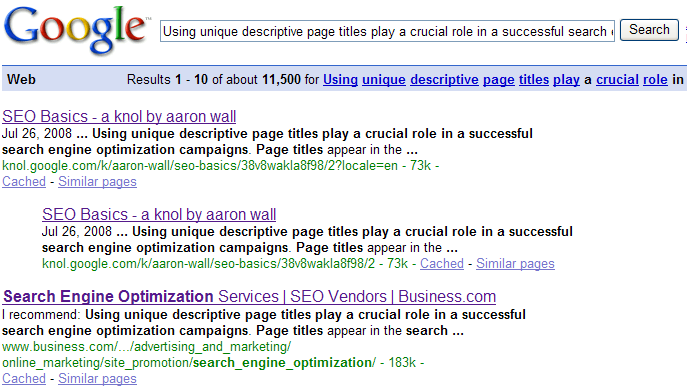Knol Off to a Quick Start
One day after Knol publicly launched Wil Reynolds noticed that a Knol page was already ranking. Danny Sullivan did a further test showing that 33% of his test set of Knol pages were ranking in the first page of search results. Danny was also surprised that his Knol was ranking #28 after 1 day. After citing it on his blog now that Knol page ranks #1 in Google!
Google's House Advantage
From the above data (and the aggressive promotion of YouTube content after the roll out of universal search) it is fair to state that house content is favored by the Google algorithm.
Another Knol Test
Maybe we are being a bit biased and/or are rushing to judgement? Maybe a more scientific effort would compare how Knol content ranks to other content when it is essentially duplicate content? I did not want to mention that I was testing that when I created my SEO Basics Knol, but the content was essentially a duplicate of my Work.com Guide to Learning SEO (that was also syndicated to Business.com). Even Google shows this directly on the Knol page
Google Knows its Duplicate Content

Is Google the Most Authoritative Publisher?
Given that Google knows that Business.com is a many year old high authority directory and that the Business.com page with my content on it is a PageRank 5, which does Google prefer to rank? Searching for a string of text on the page I found that the Knol page ranks in the search results.

If I override some of Google's duplicate content filters (by adding &filter=0 to the search string) then I see that 2 copies of the Knol page outrank the Business.com page that was filtered out earlier.

Some may call this the Query Deserves Freshness algorithm, but one might equally decide to call it the copyright work deserves to be stolen algorithm. Google knows the content is duplicate (as proven by the notification they put on their page), and yet they prefer to rank their own house content over the originally published source.

Hijacking Your Rankings via Knol - Google Knoljacking
Where this becomes a big issue is if a person...
- posts your content to Knol
- and buys/rents/begs/steals/spams/borrows a couple decent inbound links
they can get you filtered out of the search results - even if your site is an authority site. Bad news for anyone publishing copyright work online.
Google Knol Undermines the Creative Commons Spirit
Some new publishers decide to license their work via Creative Commons (hoping to be paid back based on the links economy), but Google wants no part in that! All outbound links on Knol are nofollow, so even if a person wants to give you credit for your work Google makes it impossible to do so.
Google Voids YOUR Copyright
Why do I get enraged by this sort of activity? I remember when one of my sites was voted against, and Google paid someone to steal it and wrap it in AdSense. The person who stole my content outranked me for my own content because a Google engineer thought that was reasonable and fair.
To this day someone publishes seobookopen.blogspot.com, a site dedicated to stealing and sharing an old version of my ebook. As the opening post on that blog explains
www.seobook.com very famous book from Aaron Wall its really good but paying $79 its really sucks so yesterday, I think why not to share this book to my friends etc openly in text by decompling Acrobat files
Can a casual mention get it removed? Nope. Can flagging it as spam and highlighting that it is stolen copyright content get it removed? Nope. I need to file a DMCA request to get it removed. (Or maybe they will remove it out of embarrassment after I hit publish on this post...we shall see!)
Google Pays Thieves
Google doesn't like lonely cheating housewives, unless it favors their business objectives.


